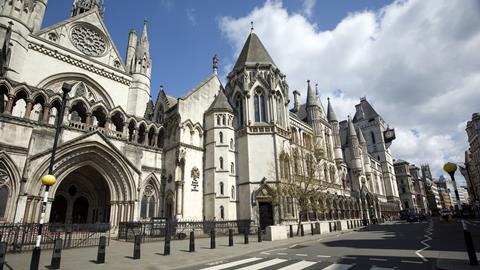A solicitor who relied on his lay client’s 'research' which cited 49 false authorities is ‘horrified’ and ‘profoundly sorry’, the High Court heard today.
Dame Victoria Sharp, president of the King’s Bench Division, and Mr Justice Johnson heard two cases in which non-existent authorities were cited. The judges will consider whether to initiate contempt of court proceedings against the practitioners involved.
Following this morning’s hearing, the afternoon focused predominantly on the case of Hamad Al-Haroun v Quatar National Bank Q.P.S.C and QNB Capital LLC in which Abid Hussain of Manchester-based Primus Solicitors was found to have relied on authorities produced by his client in relation to an application to set aside an order.
David Lonsdale, for the firm and Hussain, said: ‘There was only one solicitor who was involved in making this application, no one else was involved at all. The question obviously of what was put before the court in a letter and two witness statements was not done deliberately to mislead anyone. As to whether it was done recklessly, in my submission, it was not.’
The court heard the test of recklessness in the judgment of Mrs Justice Whipple, as she then was, in Newson-Smith v Al Zawawi, involved a ‘conscious consideration of whether material was true or false’.
Lonsdale said the case ‘could not be worse’ in that Hussain had relied on citations of authorities produced by his lay client, 49 of which were found to be false. The false authorities were found after the judge dealing with the application spotted one of the cases cited as being decided by her.
A client's eagerness to produce his own research of cases ‘really should be a red flag [for] any competent solicitor’, Lonsdale said. 'The fact he simply allowed his lay client to do the research and, more over, prepared the letter to be sent to the court and prepared witness statements for him and his solicitor – we do not underestimate how serious all this is.
‘It could not be worse. It should never have happened. You do not have a lay client doing research on legal matters, [the client] should not be citing legal authorities in witness statements anyway. What is extraordinary is the very number of cases that were merrily put before the court.’
The application, the court heard, was found to be without merit.
Lonsdale said: ‘The application itself was hopeless anyway. It was unlikely to lead to a miscarriage of justice but of course the risk in principle was there. There is a special responsibility on the solicitor who is preparing the application to make sure what is coming before the court is genuine. I can say nothing to diminish…what went wrong, it was very very bad indeed. It is relevant, in my submission, there was no apparent thought as to whether it [the authorities cited] was true or false.'
A witness statement by counsel in the case to the hearing was ‘factually true but inadequate’, Lonsdale said. 'He fails to admit he did not advise it was totally inappropriate to rely on research done by lay client and did not advise on the very large number of authorities in these two witness statements He did not advise that the application was hopeless and should never have been made.'
Also absent from counsel’s advice was that, in making the application, the solicitor would be in a position ‘likely to face contempt proceedings and ... ridicule’.
Lonsdale said Hussain and the firm accepted their share of the blame. He added: ‘This is simply a case where he believed his client’s research. The firm is horrified, the individual solicitor is horrified. He accepts all the criticisms that have been made, he has made them of himself. He can not reproach himself more for what has happened.’
The court heard Hussain had self-reported to the Solicitors Regulation Authority but his actions were ‘not a contempt of court because he neither believed what he was putting forward was false and it was not reckless’.
Lonsdale told the court the SRA would be investigating the matter and it was ‘perhaps not necessary’ for the court to impose further sanctions.
Judgment was reserved.





























